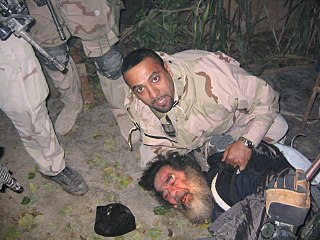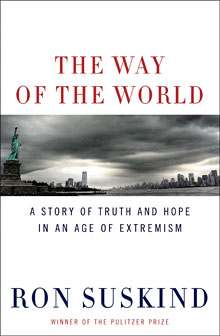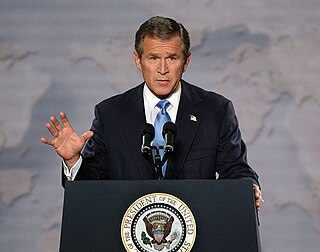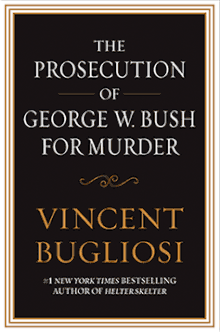
Iraq actively researched and employed weapons of mass destruction (WMD) from 1962 to 1991, after which it destroyed its chemical weapons stockpile and halted its biological and nuclear weapon programs as required by the United Nations Security Council. The fifth president of Iraq, Saddam Hussein, was internationally condemned for his use of chemical weapons against Kurdish civilians and military targets during the Iran–Iraq War. Saddam pursued an extensive biological weapons program and a nuclear weapons program, though no nuclear bomb was built. After the Gulf War, the United Nations located and destroyed large quantities of Iraqi chemical weapons and related equipment and materials; Iraq ceased its chemical, biological and nuclear programs.
The 2003 invasion of Iraq began on March 20. On March 18, US President George W. Bush had set a deadline for the ruler of Iraq, Saddam Hussein, and his two sons, Uday and Qusay, to leave the country or face military action. By the time of the ultimatum, political and military preparations for the invasion were well advanced.

Tariq Aziz was an Iraqi politician who served as Deputy Prime Minister (1979–2003), Minister of Foreign Affairs (1983–1991) and a close advisor of President Saddam Hussein. Their association began in the 1950s when both were activists for the then-banned Arab Socialist Ba'ath Party. He was both an Arab nationalist and a member of the Chaldean Catholic Church.

Lawrence Ari Fleischer is an American media consultant and political aide who served as the 23rd White House Press Secretary, for President George W. Bush, from January 2001 to July 2003.

Vincent T. Bugliosi Jr. was an American prosecutor and author who served as Deputy District Attorney for the Los Angeles County District Attorney's Office between 1964 and 1972. He became best known for successfully prosecuting Charles Manson and other defendants accused of the Tate–LaBianca murders that took place between August 9 and August 10, 1969.

Saddam Hussein, the deposed president of Iraq, was captured by the United States military in the town of Ad-Dawr, Iraq on 13 December 2003. Codenamed Operation Red Dawn, this military operation was named after the 1984 American film Red Dawn.

Plan of Attack is a 2004 book by the American author and investigative reporter Bob Woodward. It was promoted as "a behind-the-scenes account of how and why President [George W.] Bush decided to go to war against Iraq".
The following lists events in the year 2003 in Iraq.
Events in the year 2002 in Iraq.
Carole Coleman is an Irish journalist. Originally from Carrick-on-Shannon, County Leitrim, she is a former Washington Correspondent for RTÉ. Carole is a journalism graduate of the Dublin Institute of Technology (DIT). She is presently a reporter for the News at One on RTÉ Radio 1 and teaches Journalism at the University of Galway.

The Saddam Hussein and al-Qaeda link allegations were based on false claims by the United States government alleging that a secretive relationship existed between Iraqi president Saddam Hussein and the Sunni pan-Islamist militant organization al-Qaeda between 1992 and 2003. U.S. president George W. Bush used it as a main reason for invading Iraq in 2003.

The trial of Saddam Hussein was the trial of the deposed President of Iraq Saddam Hussein by the Iraqi Interim Government for crimes against humanity during his time in office.

There are various rationales for the Iraq War that have been used to justify the 2003 invasion of Iraq and subsequent hostilities.
The 2003 United States–British–Spanish Draft Resolution on Iraq was, according to Ambassador John Negroponte, "a resolution to have the Council decide that Iraq is not complying, is out of compliance, with Resolution 1441". Initially introduced on February 24, 2003, and amended on March 7, 2003, the draft set a March 17 deadline for Iraq to demonstrate "full, unconditional, immediate and active cooperation in accordance with its disarmament obligations." The draft was based on information from the Iraqi defector "Curveball," who claimed Saddam Hussein was in possession of weapons of mass destruction, which Curveball later admitted was untrue. The widely discussed UN resolution was not brought up for formal vote after it became clear that it would not have passed due to opposition from France, Russia, and China. The United States invaded Iraq without UN support on March 20, 2003, initiating the Iraq War.

The legality of the Iraq War is a contested topic that spans both domestic and international law. Political leaders in the US and the UK who supported the invasion of Iraq have claimed that the war was legal. However, many legal experts and other world leaders have argued that the war lacked justification and violated the United Nations charter.

The Way of the World: A Story of Truth and Hope in an Age of Extremism is a 2008 non-fiction book by Ron Suskind, reporting on various actions and policies of the George W. Bush administration. Most notably, it alleges that the Bush administration ordered the forgery of the Habbush letter to implicate Iraq as having ties to al Qaeda and the hijackers in the September 11 attacks. All these claims have been strenuously denied by the White House and all parties involved. The book, published on August 5, 2008, by Harper, met mixed reviews but received considerable media attention and created controversy.
The Habbush letter, or Habbush memo, is a handwritten message dated July 1, 2001, which appears to show a link between al-Qaeda and Iraq's government. It purports to be a direct communication between the head of Iraqi Intelligence, General Tahir Jalil Habbush al-Tikriti, to Iraqi president Saddam Hussein, outlining mission training which Mohamed Atta, one of the organizers of the September 11 attacks, supposedly received in Iraq. The letter also claims that Hussein accepted a shipment from Niger, an apparent reference to an alleged uranium acquisition attempt that U.S. President George W. Bush cited in his January 2003 State of the Union address.

Prior to the Iraq War, the United States accused Iraq of developing weapons of mass destruction and having links with al-Qaeda. In 1991, the United Nations Security Council Resolution 687 was adopted and subsequent UN weapons inspectors were inside Iraq. This period also saw low-level hostilities between Iraq and the United States-led coalition from 1991–2003.

The interrogation of Saddam Hussein began shortly after his capture by U.S. forces in December 2003, while the deposed president of Iraq was held at the Camp Cropper detention facility at Baghdad International Airport. Beginning in February 2004, the interrogation program, codenamed Operation Desert Spider, was controlled by Federal Bureau of Investigation (FBI) agents. Standard FBI FD-302 forms filed at the time were declassified and released in 2009 under a U.S. Freedom of Information Act request filed by the National Security Archive. Saddam, identified as "High Value Detainee #1" in the documents, was the subject of 20 "formal interviews" followed by five "casual conversations." Questioning covered the span of Saddam's political career, from 2003 when he was found hiding in a "spider hole" on a farm near his home town of Tikrit, back to his role in a failed 1959 coup attempt in Iraq, after which he had taken refuge in the very same place, one report noted.
The Prosecution of an American President is a 2012 American documentary film about the Iraq War directed by Dave Hagen and David J. Burke. Former prosecutor Vincent Bugliosi outlines his legal case for prosecution of George W. Bush for deliberately starting the war under false pretenses, misleading America over Saddam Hussein's weapons of mass destruction, and falsely blaming Iraq for the 9/11 attacks. Noted attorney Alan Dershowitz also comments.













